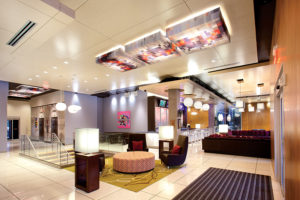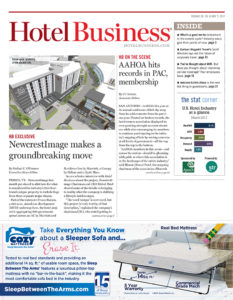ORLANDO, FL—At the Aloft Orlando Downtown, being environment-friendly is part of the property’s DNA from the outside in. An adaptive-reuse project, the 118-room hotel once served as the city’s Utilities Commission building before Hawthorne, NY-based owner GDC Properties LLC saw the potential in the building—shuttered in 2008—and decided to transform the 1968 structure into the lifestyle brand’s new digs.
What the real estate investment and development company didn’t change, however, was its commitment to ensuring the project would utilize sustainable elements and retain key architectural features that would give a nod to the building’s past life.
Kept were thick, marble walls; terrazzo floors; teakwood paneling that once enclosed executive offices; floor-to-ceiling windows; and 10-ft. ceiling heights. Eco-friendly construction materials and mechanical systems also were used in the adaptive-reuse, all of which led to the hotel being awarded LEED Gold status from the U.S. Green Building Council (USGBC).
It also has a Florida Green Lodging certification as well.
The Aloft brand is not mandated by its franchise agreement to be “green,” so when asked why this particular project went that way, hotel General Manager Craig Leicester quoted GDC Properties president, William Ingraham, as saying: “We’re primarily interested in making Aloft Orlando a high-performance building because this is the right thing to do.”
Leicester agreed. “I think that the opportunity to do something like this truly is the right thing to do: to look into the future, look forward from an aspect of sustainability and green initiatives,” he said.

The lobby of the Aloft Orlando Downtown showcases the building’s original teakwood paneling and terrazzo floors.
The Aloft Orlando Downtown is also a foray into lodging for GDC Properties. Founded in 1964 by Samuel Ginsburg, who co-chairs the company with Adam Ginsburg, it has a mixed property portfolio in New York, New Jersey, Delaware, Colorado, Georgia and Florida that encompasses multifamily residential, condos and apartments.
“They actually looked at the building with the intention of doing high-end apartments, but there is no parking on-site, so that became a challenge for them,” said Leicester. “But they still decided they loved the building and there were a lot of cool things that could be done with it, so they purchased it anyway, then partnered with Starwood [Hotels & Resorts Worldwide, the brand’s former franchisor].”
The move also introduced the Aloft brand to Orlando.
The property had been operated by Alabama-based Yedla Management Co. until this past February, when Tampa, FL-based McKibbon Hospitality took over as the management company.
Leicester noted at one point there had been talk of demolishing the building. “Cities like Orlando are so typical of this behavior. If you take every 45-year-old building and knock it down you’re never going to have a historic building. So, in preserving this building we have been placed on the National Register of Historic Places. The building’s only 50 years old, but in another 50 years, it’s still going to be here and it will truly be a historic building,” he said.
The South Orange Ave. building shares the distinction with such other landmarks in Orlando as the Tinker Building, the Jack Kerouac House and the First Church of Christ Scientist.
The Aloft Orlando Downtown includes the brand’s signature features such as the re:fuel grab-and-go area, re:charge fitness facility and w xyz bar along with an outdoor pool, 7,000 sq. ft. of meeting space and valet parking.
Environment-friendly features include the HVAC control system, said the GM, noting cost efficiencies have been realized. “We have sensors in all of the rooms; we know when they’re occupied. When the guest checks out, the AC system automatically adjusts itself. When the guest checks in, same deal. It updates the computer and sends a signal up to the room to modify the temperature accordingly. We have special lighting-control systems and a lot of LED sources in the building (and on its outside, where LED lighting changes the color of the hotel’s exterior); everything is very cost effective. We have a solar field on the roof of the building that heats all of our hot water for laundry,” he said. The solar field helps cut down on gas consumption as well.
There’s also 3M window coating on all exterior windows to minimize ultraviolet rays.
Some “green” of another sort also has been realized by the hotel.
“One of the things that was big right out of the gate due to the LEED designation was some fairly sizeable tax-credit supplements. They’re a little harder to underwrite, but that doesn’t make them any less real,” said the GM.
To encourage and engage guests to go with the [low]flow, the Aloft offers its “Make a Green Choice” program that gives guests an opportunity to exchange having daily service in their rooms for either loyalty-program points or a voucher for a drink, food or something else of monetary value.
The hotel also has a paperless check-in/checkout process. “We confirm what email address they’d like their folio sent to versus automatically reverting to a paper copy,” said Leicester, adding low-flow showers, toilets and sinks are in place along with a towel-/sheet-use conservation program. Additionally, wastebaskets in the guestrooms include one for recyclables and room attendants’ carts have bins to separate trash from recyclables.
While there’s no specific training for staff around being LEED Gold certified, the GM said, “It’s more of an ongoing conscious effort throughout the team to adopt this green mentality.”
The Aloft’s chief engineer, Mario Villegas, serves as the property’s “sustainability champion,” ensuring the hotel stays on track in its eco-efforts. “He liaises with the maintenance guys, the engineers, housekeeping and really all of the teams. When we do orientation, he’s the one who will talk to all the green aspects (along with the GM). He actually opened the hotel with me,” said Leicester, who noted being environmentally aware is almost second nature to him.
“I was born and raised in Canada and our recycling and green initiatives are leaps and bounds ahead of what the U.S. has been doing for decades. When I was a child, the recycling initiatives and not throwing trash on the ground, these things were all inherent to me. I moved here in 2005 and when I first came down here, there was no recycling. It just didn’t make sense to me. I show up in a new country in my twenties and all of a sudden everything goes in the trash: bottles, cans, plastic. We’re throwing all of this stuff away and it’s so socially irresponsible. I’m delighted to now be in an environment where I can continue to enhance our global footprint. I think we’re making progress, but we’re not there.”
Leicester said Aloft’s business mix—the majority of it corporate business travelers, including many millennials—is on board with sustainability.
“This generation is much more cognizant of what’s happening to our planet and what we need to do to ensure that it is still around for future generations to enjoy. And we’re thrilled at any opportunity to enlighten our guests and share with our guests some of our initiatives and efforts to stay green,” he concluded. HB

